小学英语六年级下册词汇和阅读
小学六年级下册英语单词汇总
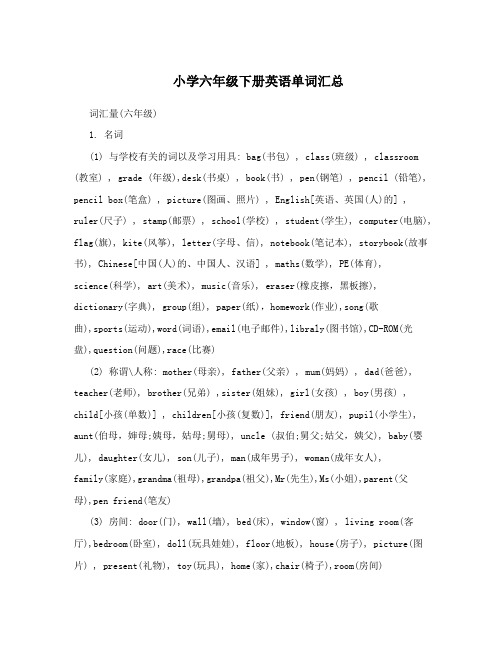
小学六年级下册英语单词汇总词汇量(六年级)1. 名词(1) 与学校有关的词以及学习用具: bag(书包) , class(班级) , classroom (教室) , grade (年级),desk(书桌) , book(书) , pen(钢笔) , pencil (铅笔), pencil box(笔盒) , picture(图画、照片) , English[英语、英国(人)的] ,ruler(尺子) , stamp(邮票) , school(学校) , student(学生), computer(电脑), flag(旗), kite(风筝), letter(字母、信), notebook(笔记本), storybook(故事书), Chinese[中国(人)的、中国人、汉语] , maths(数学), PE(体育),science(科学), art(美术), music(音乐), eraser(橡皮擦,黑板擦),dictionary(字典), group(组), paper(纸),homework(作业),song(歌曲),sports(运动),word(词语),email(电子邮件),libraly(图书馆),CD-ROM(光盘),question(问题),race(比赛)(2) 称谓\人称: mother(母亲), father(父亲) , mum(妈妈) , dad(爸爸), teacher(老师), brother(兄弟) ,sister(姐妹), girl(女孩) , boy(男孩) ,child[小孩(单数)] , children[小孩(复数)], friend(朋友), pupil(小学生), aunt(伯母,婶母;姨母,姑母;舅母), uncle (叔伯;舅父;姑父,姨父), baby(婴儿), daughter(女儿), son(儿子), man(成年男子), woman(成年女人),family(家庭),grandma(祖母),grandpa(祖父),Mr(先生),Ms(小姐),parent(父母),pen friend(笔友)(3) 房间: door(门), wall(墙), bed(床), window(窗) , living room(客厅),bedroom(卧室), doll(玩具娃娃), floor(地板), house(房子), picture(图片) , present(礼物), toy(玩具), home(家),chair(椅子),room(房间)(4) 生活用品: clock(钟), box(盒子), cup(茶杯), table(饭桌), key(钥匙) , watch(手表), umbrella(雨伞),toy(玩具),TV(电视),newspaper(报纸),photo(照片),telephone(电话),chopsticks(筷子),knife(小刀),fork(叉子)(5) 交通工具: bike(自行车), bus(公共汽车) , jeep(吉普车) , car(小汽车) , plane(飞机) , boat (小船), ship(大船), train(火车), taxi(出租车),(6) 饮食: water(水), tea(茶), egg(鸡蛋), cake(蛋糕), rice(米饭),pear(梨) , orange(橘子), fish(鱼), apple(苹果) ,banana(香蕉),pineapple(菠萝), bread(面包), breakfast(早餐), lunch(午餐), dinner(晚餐、晚宴), chicken(鸡肉), dumplings(饺子), fruit(水果), grape(葡萄), hamburger(汉堡包), hot dog(热狗), mango(芒果), milk(牛奶), noodles(面条), peach(桃子), pizza(比萨), pop(汽水,香槟酒),soup(汤), vegetable(蔬菜), butter(黄油), sweet(糖果), supper(晚餐),meat(肉),restaurant(宾馆),meal(一餐,一顿)(7) 服装: coat(上衣,外衣,外套), skirt(女裙), shirt (衬衫), T-shirt(T恤衫), hat[帽子〔一般是指有边的〕,礼帽] , dress(女服,童装), shoe [鞋子(单数)], sock(短袜), cap(无边帽), sweater(毛衣)1(8) 游戏: kite(风筝), game(游戏) , basketball(篮球) , ball(球), football (篮球),balloon(气球),(9) 职业: policeman(警察), driver(司机), postman(邮递员), doctor(医生), nurse(护士), farmer(农民), teacher(老师), businessman(商人), engineer(工程师),dancer(舞女;舞蹈家) (10) 自然: tree(树) , sunny(晴朗的), rain(雨、雨天), rainy(下雨的), wind(风), windy(刮风的), cloud(云), cloudy(多云的), rainbow(彩虹), star(星星), light(光线), weather(天气), mountain(山脉),river(河),snow(雪),spring(春天),summer(夏天),autumn(秋天),winter(冬天),sun(太阳),flower(花朵),lake(湖),sea(海),(11) 动物: panda(熊猫), lion(狮子), elephant (大象), monkey(猴子) , tigers(老虎) , rabbit(兔子) , snake(蛇 ), dog(狗) , cat(猫) , chick(小鸡), pig (猪),sheep (绵羊), cow(奶牛) , giraffe(长颈鹿) ,bird(鸟) , dragon(龙), fish(鱼) , bear(熊), bee(蜜蜂), deer(鹿), duck(鸭子), fox(狐狸), goat(山羊), goose(鹅), hen(母鸡),mouse(耗子), parrot(鹦鹉), rooster(雄鸡), pet(宠物)(12) 颜色: colors(颜色), red (红色的), yellow(黄色的) , black(黑色的) , blue (蓝色的), green(绿色的) , white(白色的) , orange(橙色的), purple(紫色的), pink(粉红的), brown(棕色的)(13) 身体部位: body(身体), head(头), hair(头发), face(脸), ear(耳朵), eye(眼睛),nose(鼻子), mouth(嘴巴), tooth([牙齿(单数)], shoulder(胳膊), arm(肩膀), hand(手), finger(指头), leg(腿), knee(膝盖), toe(脚趾), foot(脚),(14) 星期: week(星期,周), Sunday(星期天) , Monday(星期一), Tuesday(星期二) ,Wednesday(星期三), Thursday(星期四) , Friday (星期五),Saturday(星期六), weekend(周末) (15) 其他: sun(太阳), moon(月亮), day(天) , night(夜晚), zoo(动物园), park(公园),afternoon(下午),morning(早上),evening(晚上),name(名字),road(路),shop(商店),street(街道),time(时间),today(今天),tonight(今晚),delicious(美味的),holiday(假日),idea(主意),message(信息),airport(飞机场),ticket(票),list(清单),postcard(卡片),square(广场),stamp(邮票),hoobby(爱好),festival(节日),address(地址),building(建筑物),ruler(尺子),line(线)(16) 国家:America(美国),American(美国的、美国人),theUSA(美国),Canada(加拿大),China(中国),Chinese(中国的、中国人),England(英格兰、英国),English(英国的、英国人),theUK(英国) (17) 月份:January(一月),February(二月),March(三月),April(四月),May(五月),June(六月),July(七月),August(八月),September(九月),October(十月),November(十一月),December(十二月)2. 冠词: a , an(用在以元音音素开始的词前〕, the〔特定用法〕这(个),那(个);这种,那种;这一类,那一类的23.代词: I(我), you(你) , he(他) , she(她) , it(它) , we(我们) ,you(你们) , they(他们) , me(我) , him(他) , my(我的), our (我们的),us(我们), your(你的、你们的), yours(你的、你们的), her(她的), hers(她的) , his(他的) , their(他们的), theirs(他们的), them(他们), mine(我的), this(这个) , that(那个) , these (这些), those(那些) ,who(谁) , what(什么) , which(哪一个), some(一些),whose(谁的),any(一些)4. 动词: am(第一人称) , is(第三人称) , are (复数), look(看) ,come(来) , go(去), play(玩) , sing (唱), run (跑), do(做) , fly (飞),give(给) , has[吃、举行、拥有(第三人称单数)], have(意思同前,用于第一人称及复数) , spell (拼读), stand(站) , thank (谢谢),think (想), can(能), eat(吃), drink(喝), laugh(笑), listen(听), open(打开), please(请),point(指向), see(看), swim(游泳), dance(跳舞), sit(坐), help(帮助),cut(切、坎), guess(猜), enjoy(欣赏、享受), keep(保持), sent(发送),leave(离开), borrow(借), use(用), wait(等待), welcome(欢迎), visit(参观、拜访), work(工作), write(写), want(打算), clap(拍), clean(打扫),cry(哭), smile(微笑), make(制造), watch(看), learn(学会), study(学习),talk(谈话), read(读), miss(想念), hear(听到), say(说), wear(穿),ride(骑), buy(买), take(拿、带), know(知道),like(喜欢),live(居住),love(爱),meet(遇见),put(放),speak(说),tell(告诉),walk(走路),wash(洗),hope(希望),arrive(到达),believe(相信),show(展示),hurry(快走)5. 形容词: new(新的) , old(老的) , big(大的) , small (小的), fat(胖的) , fine(美好的) , good (好的), bad(坏的), happy (快乐的), nice(好的) , sorry(对不起的) , tall (高的), thin(瘦的) , busy (忙的), lazy(懒惰的) young(年轻的) , clean(干净的) , empty (空的), dirty (脏的),cold(冷的),cool(凉爽的), hot(热的), long(长的), short(短的), same(一样的) ,different(不同的) , beautiful(漂亮的) , little (年纪小的), shy(害羞的) , hungry(饿的) , clever(聪明的),dear(亲爱的),early(早的),late(迟的),easy(容易的),fast(快的),high(高的),large(巨大的),strong(强壮的),warm(温暖的),hard(努力的),light(明亮的),heavy(重的),another(另外的),ready(准备的),more(多的),special(特别的),pleased(高兴的),lucky(幸运的) 6. 副词: how(怎样) , no(不) , there(在那里) , yes(是的) ,OK(好),here(这儿),now(现在),not(不),too(也),very(很),where(在哪里),why(为什么),quickly(迅速地),sometime(有时),really(真正地),soon(不久),often(经常),always(总是、一直),never(从不),when(什么时候),slowly(慢慢地) 7. 介词: in(在…里面) , at (在,于,到;经由), on(在…上面) , to (向,到,去), under (在…下面), near(靠近) ,beside(在…附近),behind(在…后面), above(在上面;在头上), from(从), with(和), of(属于…的), up(向上), off(向下), out(出去), by(坐,乘;以), for(为了), about(关于), over(.越过), between(.位于…之间), down(向下),after(…之后)38. 数词: zero(0) , one(1) , two(2) , three (3), four(4) , five(5) , six(6) , seven(7) ,eight(8) , nine(9) , ten (10), eleven(11) , twelve(12) , thirteen (13), fourteen(14) ,fifteen(15) , sixteen(16) , seventeen(17) , eighteen(18) , nineteen (19), twenty(20),thirty(30), forty(40), fifty(50), sixty(60), seventy(70), eighty(80), ninety(90), onehundred(一百) , thousand(一千),million(百万)9. 感叹词:hello(你好) , hi(你好) , goodbye(再见) , oh(哦!啊!呀!) , well(好) ,please(请)10. 连词: and(和) , but(但是)11. 单词或短语:in the morning(早上), in the afternoon(下午), in the evening(晚上), at night(晚上), at weekend(周末) ,every day(每天), a bottle of(一瓶…), a cupof(一茶杯…), a glassof(一玻璃杯…), a lot of(大量), all right(好的), at school(在学校),at home(在家), comefrom(来自), come in (进来), go home(回家), go to school(上学), go to bed(睡觉) , howold(多少岁), in English(在英国) , New Year’s D ay(元旦) ,Children’s Day(儿童节), readafter me(), excuse me(对不起), make a friend(交朋友), how many(多少), how much(多少钱), of course(当然), on duty(值日), a pair of(一对), go to work (上班), go straight on(直走) , hurry up(赶紧) , in a hurry (很快地), Christmas Day(圣诞节),Thanksgiving Day(感恩节),Spring Festival(春节),Mid-Autumn Festival(中秋节)12.主格宾格所有格物主代词I me my mineyou you your yourshe him his hisshe her her hersit itswe us our oursthey them their theirs 4。
小学六年级下册英语阅读理解及答案
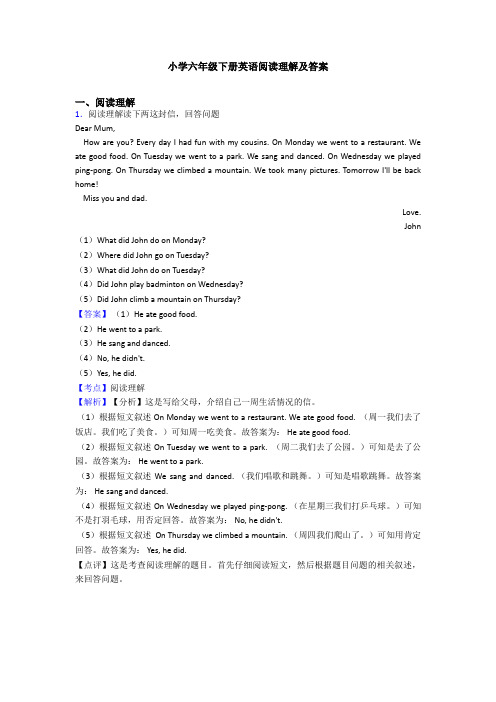
小学六年级下册英语阅读理解及答案一、阅读理解1.阅读理解读下两这封信,回答问题Dear Mum,How are you? Every day I had fun with my cousins. On Monday we went to a restaurant. We ate good food. On Tuesday we went to a park. We sang and danced. On Wednesday we played ping-pong. On Thursday we climbed a mountain. We took many pictures. Tomorrow I'll be back home!Miss you and dad.Love.John (1)What did John do on Monday?(2)Where did John go on Tuesday?(3)What did John do on Tuesday?(4)Did John play badminton on Wednesday?(5)Did John climb a mountain on Thursday?【答案】(1)He ate good food.(2)He went to a park.(3)He sang and danced.(4)No, he didn't.(5)Yes, he did.【考点】阅读理解【解析】【分析】这是写给父母,介绍自己一周生活情况的信。
(1)根据短文叙述 On Monday we went to a restaurant. We ate good food. (周一我们去了饭店。
我们吃了美食。
)可知周一吃美食。
故答案为: He ate good food.(2)根据短文叙述 On Tuesday we went to a park. (周二我们去了公园。
小学六年级(上下册)英语单词表-人教版

PEP 六年级上册四会单词词汇表Unit 1 by by ((经,乘) foot(脚) bike(自行车) bus(公共汽车) train(火车) how(怎样) go to school (上学)(上学) traffic (交通)(交通)traffic light (交通灯)(交通灯)(交通灯) traffic rule (交通规则)(交通规则) stop (停,停车站)wait (等待)(等待) get to (到达)(到达)Unit 2 library(图书馆) post post office(office(邮局) hospital(医院) ) cinema(cinema(电影院) turn(转弯) bookstore(书店) where(在哪里,到哪里) please(请) next to(与…相邻与…相邻) right (右边右边) left(左边) straight(成直线地) then (然后) Unit 3 next week(下周) this morning(今天上午) this afternoon(今天下午) this this evening evening evening ((今天晚上) comic comic book(book(漫画书) post post card(card(明信片) newspaper(报纸) buy(购买) Unit 4 hobby(爱好) ride a bike--riding a bike(骑自行车) dive--diving(跳水) play the violin —playing the violin(拉小提琴) make kites —making kites(制作风筝) collect stamps —collecting stamps(集邮) live –lives(居住) teach--teaches(教) go--goes(去) watch--watches(看) read--reads(读,看) does doesn ’t=does not Unit 5 singer(歌唱家,歌手) writer(作家) actor(男演员) actress(女演员) artist(画家) TV reporter(电视台记者) engineer(工程师) accountant(会计) policeman(男警察) salesperson(销售员) cleaner(清洁工) where (在哪里,到哪里)(在哪里,到哪里) work (工作)(工作) Unit 6 rain(雨) cloud (云) sun(太阳) stream(河,溪) come from(来自,来自,从…来) seed(种子) soil(土壤) sprout (苗,苗,芽) plant(植物,种植) should (应该应该) then(然后) PEP 六年级下册四会单词词汇表Unit 1 tall —taller 更高的更高的 short —shorter 更矮的更矮的 strong —stronger 更强壮的更强壮的 old —older 年龄更大的年龄更大的 young —younger 更年轻的更年轻的 big —bigger 更大的更大的 heavy —heavier 更重的更重的 long —longer 更长的更长的 thin —thinner 更瘦的更瘦的 small —smaller (体型)更小的(体型)更小的 Unit 2 have a fever 发烧发烧发烧 have a sore throat 喉咙疼喉咙疼 have a cold 感冒感冒 have a toothache 牙疼牙疼牙疼 have a headache 头疼头疼头疼 matter 事情,麻烦事情,麻烦 sore 疼的疼的 hurt 疼痛疼痛 nose 鼻子鼻子 tired 疲劳的,累的疲劳的,累的 excited 兴奋的兴奋的 angry 生气的生气的 happy 高兴的高兴的 bored 无聊的,烦人的无聊的,烦人的 sad 忧伤的,悲伤的忧伤的,悲伤的Unit 3 watch —watched 看 wash —washed 洗 clean —cleaned 打扫打扫 play —played 玩 visit —visited 看望看望 do —did last weekend 上一个周末上一个周末 go —went 去go to a park —went to a park 去公园去公园go swimming —went swimming 去游泳去游泳go fishing —went fishing 去钓鱼去钓鱼 read —read 读 go hiking —went hiking 去远足去远足 Unit 4 learn Chinese —learned Chinese 学汉语学汉语sing and dance —sang and danced 唱歌和跳舞唱歌和跳舞唱歌和跳舞 eat good food —ate good food 吃好吃的食物吃好吃的食物take take pictures pictures —took took pictures pictures 照相照相 climb —climbed 爬 have —had buy presents —bought presents 买礼物买礼物 row a boat—rowed a boat 划船 see see elephant elephant —saw saw elephant elephant 看大象看大象 go go skiingskiing —went went skiing skiing 去滑雪 go go ice-skating ice-skating —went went ice-skating ice-skating 去滑冰去滑冰 how 怎么,如何怎么,如何 get —got 到达到达 last 上一个的,仅余的,留在最后的上一个的,仅余的,留在最后的。
[精]外研版(三起)小学英语六年级下册知识点归纳总结
![[精]外研版(三起)小学英语六年级下册知识点归纳总结](https://img.taocdn.com/s3/m/fbef7bbadc88d0d233d4b14e852458fb770b3863.png)
[精]外研版(三起)小学英语六年级下册知识点归纳总结外研版(三起)小学英语六年级下册知识点归纳总结Module 1一、词汇look看上去cashier收银员cola可乐dollar美元cent美分XXX享用,享受careful小心的Be careful!当心!二、句子1. I want to a hot dog, please.我想要一个热狗,谢谢。
2.—How much is it?它多少钱?—It’XXX.是十三美元二十五美分。
3. Enjoy your meal!好好享受你的美食吧!4. It looks good!它看上去不错!5. Can I help you?我能为你做点什么?6. Here you are.给你。
7.—What do you want to eat?你想要吃什么?—I want a hamburger.我想要一个汉堡包。
8.—What do you want to drink?你想要喝什么?—Milk, please.牛奶,感谢。
三、句型结构①询问你想要吃什么—What do you want to eat?—I want +食物. / I want to eat ...eg:—What do you want to eat?你想要吃什么?—I want to eat noodles and beef.我想吃面条和牛肉。
②询问你想要喝什么—What do you want to drink?—I want +其他. / I want to drink...eg:—What do you want to drink?你想要喝什么?—I want to drink juice.我想和果汁。
③询问价格How much is it? / How much are they?eg:—How much is this book?这本书多少钱?—It’XXX.十五元。
—How much are these shoes?这双鞋多少钱?—XXX.它们二十美圆。
小学六年级下册英语阅读六篇(整理版)

小学六年级下册英语阅读(一)Having Breakfast in New York!It’s Saturday morning·Mrs Edwards opens the window and looks outside ·She is very happy·“It’s going to be a beautiful day!”She wakes up her small son at seven and says,“Get up,Teddy·We are gonging to the zoo today·Wash your hands and face and have your breakfast quickly·We are going to New York by car·”Teddy is six years old,He is very happy ·He gets up and washes his hands and face quickly·“Mum,let’s go· ”“But your breakfast?”“I can have it in New York·Let’s go·”重点难点:outside外面wake up 唤醒quickly 迅速地I can have it in New York·Let’s go·我可以在纽约吃早饭·根据短文内容判断句子对错·用T或F来表示正误·1.It’s a fine day today·( )2.Mrs Edwards has a little son·( )3.Mrs Edwards wants to visit her friend with her son in New York·( )4.They want to go to New York by train·( )5.Teddy has breakfast at home·( )(二)Good FriendsJane and Betty are good friends·Jane is twelve 1 old and Betty is eleven years old· I am twelve , too·But Betty is 2 than Jane and I· She is 3 very fast·Jane’s English is 4 ·Betty’s English is better·My English is the best·But Jane sings the best·We 5 help one another because we are good friends·重点难点:grow 成长读一读·你能把漏掉的单词补上吗?( )1·A·year B·ear C·years( )2·A·tall B·taller C·shorter( )3·A·growing B·grows C,grow( )4·A·OK B·good C·well( )5·A·often B·sometimes C·always阅读理解(三)There are forty-two students in our class· There are also two American boys· They are Jack and Mike· They are our good friends· They like watching TV, but they don’t like playing basket-ball ·They often go to school by bike· And I often go to school on foot· There is one English girl in our class· Her name is Lucy· She likes playing basketball and she also likes swimming· She usually does her homework in the evening· She often watches TV on Saturday afternoons· She is my good friend· All of the Chinese students are Yong Pioneer·根据短文内容·判断正(T)误(F)·()1.There are thirty-nine Chinese students in our class ·()2.There are two American girls and one English boy in our class ·()3.Jack and Mike are our good friends ·()4.Jack and Mike like playing basketball ·()5.Luck often does her homework on Saturday afternoons ·阅读理解(四)My name is Jack· I am a pupil of Grade One· I’m in No·1 Middle School· On weekdays I get up at six o’clock· I have breakfast at seven and then I g o to school by bike· We begin our class at eight o’clock in the morning· We have four classes in the morning and three in the afternoon·At noon, I have lunch at home· Classes are over at four fifteen in the afternoon· After class, we often play football in the afternoon· I go home at about five·I have supper at about six thirty in the evening· I do my homework at seven thirty·At weekend, I watch TV· I often go to bed at ten· I’m very happy·根据短文的意思·选择正确的答案·()1· Jack is a pupil in ______·A· Class One B· Grade One C· Class Two D· Grade Two()2· Jack gets up at _________ in the morning·A· five B· six C· seven D· eight()3· After class they often play ______ on the playground·A· volleyball B· basketball C· football D· ping-pong()4· Jack often watches TV on __________·A· Monday B· Thursday C· Sunday D· Tuesday()5· Which is true (真实的)? _________ ·A· jack is a good boy·B· Jack has his lunch at school·C· Jack watches TV every day·D· Jack is not happy·阅读理解(五)Jill and Kate are going hiking (徒步旅行) with their class tomorrow · They went to take some fruit with them· Jill likes oranges and Kate likes apples· When they get to the market, they can’t find any oranges, and the apples are too green· “What are we going to buy now?” asks Kate “Hey ,what’s that big round fruit over there ?” asks Jill ·”I don’t know· Let’s ask the sales-girl·” “What do you call this?” “You zi(柚子),”answers the girl · “Why don’t we buy one?” asks Jill “OK· We’re going to have lots of fun hiking and eating a new kind of fruit! ”says Kate·根据短文内容·判断正(T)误(F)·()1.Kate is going hiking this afternoon ·()2.Jill like apples and Kate like oranges ·()3.They don’t buy apples because the apples are too green ·()4.Youzi is a big round fruit ·()5.They’re going to eat a new kind of fruit tomorrow ·阅读理解(六)Miss Lee is only twenty-one· She is tall and thin(瘦), and she has brown, long hair· She likes children and her teaching work·From Monday to Friday she stays at school and gives the children classes·She has much work to do, but she often plays games with her students after school· The children like her very much· On Sunday she drive s her car to her father’s house and stays with her father and mother· Sometimes she goes to see her friends on Sunday· She drives back to school on Monday morning·She likes singing, dancing and swimming· She’s a nice teacher·根据短文的意思·选择正确的答案·( )1· Miss Lee is a ________ teacher ·A· very good B· very old C· good English D· good Chinese( )2· Which is right ? __________A· She has no work to do, and often plays with the children·B· She plays with the children from Monday to Friday·C· She likes her students and plays games with them·D· She always (总是) works, but doesn’t play at all ·( )3· She goes and sees her friends ___________ ·A· every day B· on Sunday C· on Saturday D· on Friday( )4· Miss Lee goes home _________ ·A· in her car B· on a bus C· on foot D· by her car( )5·Miss Lee likes ________ ·A· driving B· cooking C· running D· teaching。
人教版小学英语六年级下册英语单词表

人教版小学英语六年级下册词汇学习表Unit 1younger ['jʌŋɡə(r)] 更年轻的older ['əʊldər] 更年长的taller [ˈtɔːlə] 更高的shorter [ˈʃɔːtə] 更矮的longer [ˈlɒŋgə] 更长的thinner [ˈθɪnə(r)] 更瘦的heavier [ˈhɛvɪə] 更重的bigger [ˈbɪgə] 更大的smaller [ˈsmɔːlə] 更小的stronger [ˈstrɒŋgə] 更强壮的dinosaur [ˈdaɪnəsɔː(r)] 恐龙hall [hɔːl] 大厅metre [ˈmiːtə(r)] 米than [ðæn , ðən] 比both [bəʊθ] 两个都kilogram [ˈkɪləɡræm]千克countryside [ˈkʌntrisaɪd] 乡村lower [ˈləʊə(r) , ˈlaʊə(r)] 更低地shadow [ˈʃædəʊ] 影子smarter [ˈsmɑːtə] 更聪明的become [bɪˈkʌm] 变成Unit 2cleaned [kliːnd] (clean的过去式)打扫stayed [steɪd] (stay的过去式)停留,待washed [wɒʃt] (wash的过去式)洗watched [wɒtʃt] (watch的过去式)看had [həd] (have的过去式)患病;得病had a cold [həd ə kəʊld] 感冒slept [slept] (sleep的过去式)睡觉read [riːd , red] (read的过去式)读saw [sɔː] (see的过去式)看见last [lɑːst] 最近的;上一个的yesterday [ˈjestədeɪ] 昨天before [bɪˈfɔː(r)] 在……之前drank [dræŋk] (drink的过去式)喝show [ʃəʊ] 演出magazine [ˌmæɡəˈziːn] 杂志better [ˈbetə(r)] (well的比较级)更好的faster [ˈfɑːstə] (fast的比较级)更快的hotel [həʊˈtel] 旅馆fixed [fɪkst] (fix的过去式)修理broken [ˈbrəʊkən] 破损的lamp [læmp] 台灯loud [laʊd] 喧闹的;大声的enjoy [ɪnˈdʒɔɪ] 享受……的乐趣;喜爱stay [steɪ] 暂住;逗留Unit 3went [went] 去camp [kæmp]野营went camping 去野营fish [fɪʃ] 钓鱼went fishing 去钓鱼rode [rəʊd] 骑hurt [hɜːt] 受伤ate [eɪt] 吃took [tʊk] 拍照took pictures 照相bought [bɔːt] 买gift [ɡɪft 礼物fell [fel] 摔倒off [ɒf] 落下Labour Day [ˈleɪbə(r) deɪ] 劳动节mule [mjuːl] 骡子Turpan 吐鲁番could [kʊd , kəd] 能till [tɪl] 直到beach [biːtʃ] 沙滩basket [ˈbɑːskɪt] 篮子part [pɑːt] 角色licked [lɪkt] 舔laughed [lɑːft] 笑Unit 4dining hall [ˈdaɪnɪŋ hɔːl] 饭厅grass [ɡrɑːs] 草坪gym [dʒɪm] 体育馆ago [əˈɡəʊ] 以前cycling [ˈsaɪklɪŋ] 骑自行车运动go cycling 去骑自行车ice-skate [ˈaɪs skeɪt] 滑冰badminton [ˈbædmɪntən] 羽毛球运动star [stɑː(r)] 星easy [ˈiːzi] 容易的look up ['lʊkʌp] 查阅Internet [ˈɪntənet] 互联网different [ˈdɪfrənt] 不同的active [ˈæktɪv] 活跃的race [reɪs] 赛跑nothing [ˈnʌθɪŋ] 没有什么thought [θɔːt] 想felt [felt] 感觉cheetah [ˈtʃiːtə] 猎豹trip [trɪp] 绊倒woke [wəʊk] 醒dream [driːm] 梦Proverbs谚语Where there is a will, there is a way! 有志者事竟成!Life is what you make it! 生活是自己创造出来的!Believe in yourself!相信自己!。
新沪教牛津版六年级下册小学英语全册单元知识点小结
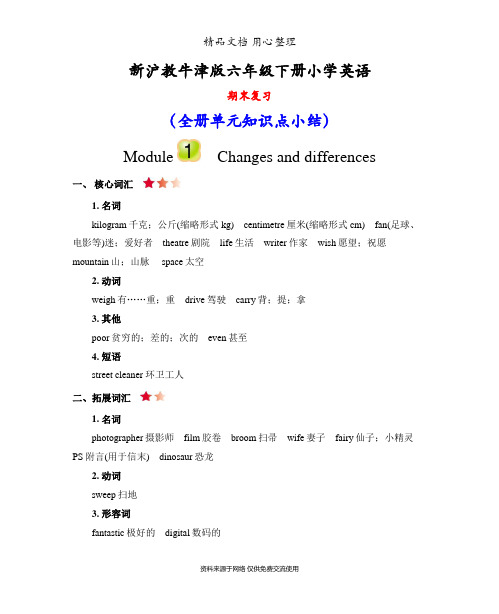
新沪教牛津版六年级下册小学英语期末复习(全册单元知识点小结)Module Changes and differences一、核心词汇1. 名词kilogram千克;公斤(缩略形式kg)centimetre厘米(缩略形式cm)fan(足球、电影等)迷;爱好者theatre剧院life生活writer作家wish愿望;祝愿mountain山;山脉space太空2. 动词weigh有……重;重drive驾驶carry背;提;拿3. 其他poor贫穷的;差的;次的even甚至4. 短语street cleaner 环卫工人二、拓展词汇1. 名词photographer摄影师film胶卷broom扫帚wife妻子fairy仙子;小精灵PS附言(用于信末)dinosaur恐龙2. 动词sweep扫地3. 形容词fantastic极好的digital数码的4. 副词online在线地;在线的5. 代词themselves他们自己;她们自己;它们自己6. 其他taller更高的7. 短语go fishing去钓鱼enjoy oneself玩得愉快;得到乐趣get … in收割street sweeper扫地车by hand用手right away立即;马上in a short time很快head teacher 校长 a piece of一张;一片have a picnic去野餐better and better越来越好三、核心句型1. I’m 150 centimetres tall. 我身高150厘米。
解读:这是介绍身高的句型。
“主语 + be动词 + 数字 + 长度单位(+ tall).”可以用来介绍某人的身高。
举一反三: My cousin is 154 centimetres tall. 我的堂弟身高154厘米。
Jim is 149 centimetres tall. 吉姆身高149厘米。
2. There are a lot of tall buildings in the city. 城市里有很多高大的建筑物。
人教版六年级英语下册各单元必背词汇和句型
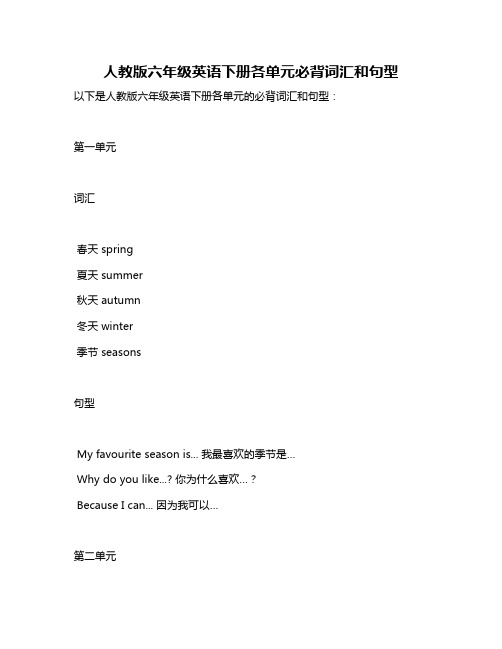
人教版六年级英语下册各单元必背词汇和句型以下是人教版六年级英语下册各单元的必背词汇和句型:第一单元词汇春天 spring夏天 summer秋天 autumn冬天 winter季节 seasons句型My favourite season is... 我最喜欢的季节是…Why do you like...? 你为什么喜欢…?Because I can... 因为我可以…第二单元词汇游泳 swim滑冰 skate放风筝 fly a kite堆雪人 make a snowman季节活动 seasonal activities句型What do you do in the...? 你在…做什么?I usually... 我通常…Do you often...? 你经常…吗?Yes, I do. / No, I don’t. 是的,我经常。
/ 不,我不经常。
第三单元词汇星期一 Monday星期二 Tuesday星期三 Wednesday星期四 Thursday星期五 Friday星期六 Saturday星期日 Sunday星期 weekdays星期天 weekends句型What do you have on...? 你星期几有什么课?I have... 我星期几有…课。
When do you have...? 你什么时候有…课? I have... on... 我在星期几有…课。
第四单元词汇电影 movies公园 parks图书馆 libraries博物馆 museums商店 shops饭店 restaurants医院 hospitals学校 schools银行 banks邮局 post offices公共场所 public places 句型。
【英语】小学六年级下册英语阅读理解含答案

【英语】小学六年级下册英语阅读理解含答案一、阅读理解1.阅读理解阅读短文,判断正误。
It's Saturday morning. My friends and I are going to the park. It's near our school. We get there by bike. There are a lot of people in the park. Some girls are skipping. Some boys are flying kites. I am watching boats on the lake. I like them. Rowing a boat is fun. We are going to see a film in the evening. Everyone is having a good time.(1)I am going to the park with my parents on Saturday morning.(2)We get to the park by bike.(3)Some boys are flying kites.(4)I am watching boats. I like rowing boats.(5)We are going to see a film tomorrow.【答案】(1)0(2)1(3)1(4)1(5)0【考点】阅读理解【解析】【分析】文章大意:介绍“我”跟朋友们星期六上午去公园的事情。
(1)句意:星期六上午我跟我的父母去公园了。
根据My friends and I are going to the park.可知我跟朋友们去公园了。
故答案为:错误。
(2)句意:我们骑自行车去公园。
根据We get there by bike.可知我们骑自行车去公园。
故答案为:正确。
(3)句意:一些男孩子正在放风筝。
人教版小学英语五六年级单词表
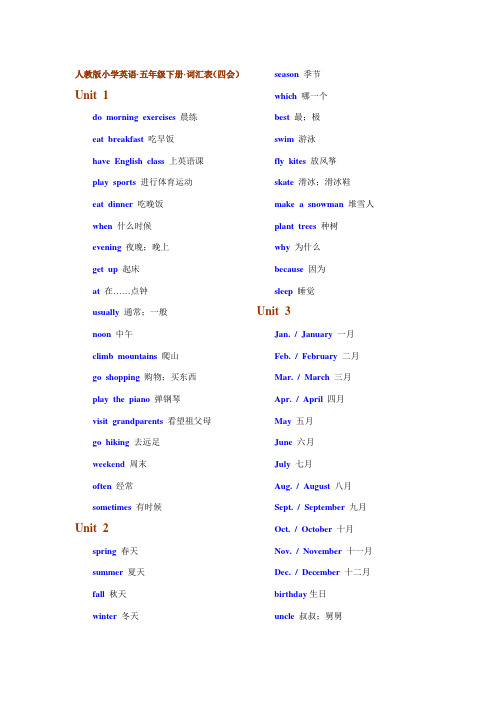
人教版小学英语·五年级下册·词汇表(四会)Unit 1do morning exercises晨练eat breakfast吃早饭have English class上英语课play sports进行体育运动eat dinner吃晚饭when什么时候evening夜晚;晚上get up起床at在……点钟usually通常;一般noon中午climb mountains爬山go shopping购物;买东西play the piano弹钢琴visit grandparents看望祖父母go hiking去远足weekend周末often经常sometimes有时候Unit 2spring春天summer夏天fall秋天winter冬天season 季节which哪一个best最;极swim游泳fly kites放风筝skate滑冰;滑冰鞋make a snowman堆雪人plant trees种树why为什么because因为sleep睡觉Unit 3Jan. / January一月Feb. / February二月Mar. / March三月Apr. / April四月May五月June六月July七月Aug. / August八月Sept. / September九月Oct. / October十月Nov. / November十一月Dec. / December十二月birthday生日uncle叔叔;舅舅her她的date日期Unit 4draw pictures画画cook dinner做饭read a book看书answer the phone接电话listen to music听音乐clean the room打扫房间write a letter写信write an e-mail写电子邮件mom妈妈grandpa爷爷;外公study书房Unit 5fly飞jump跳walk走run跑swim游泳kangaroo袋鼠sleep睡觉climb往上爬fight打架swing荡;荡秋千drink water喝水Unit 6take pictures照相watch insects观察昆虫pick up leaves采摘树叶do an experiment做实验catch butterfly捉蝴蝶honey蜂蜜count insects数昆虫collect leaves收集树叶write a report写报告play chess下棋have a picnic举行野餐人教版小学英语·六年级上册·词汇表(四会)Unit 1by 经,乘foot脚bike自行车bus公共汽车train火车how怎样go to school上学traffic交通traffic light交通灯traffic rule交通规则stop停,停车站wait等待get to到达Unit 2library图书馆post office邮局hospital医院cinema电影院bookstore书店where在哪里,到哪里please请next to与……相邻turn转弯right 右边left左边straight成直线地then 然后Unit 3next week下周this morning今天上午this afternoon今天下午this evening 今天晚上comic book漫画书post card明信片newspaper报纸buy购买Unit 4hobby爱好ride a bike→riding a bike骑自行车dive→diving跳水play the violin→playing the violin 拉小提琴make kites→making kites制作风筝collect stamps→collecting stamps集邮live→lives居住teach→teaches教go→goes去watch→watches看read→reads读,看then然后does doesn’t=does notUnit 5singer歌唱家,歌手writer作家actor男演员actress女演员artist画家TV reporter电视台记者engineer工程师accountant会计policeman男警察salesperson销售员cleaner清洁工where在哪里,到哪里work工作Unit 6rain雨cloud 云sun太阳stream河,溪come from来自,从……来seed种子soil土壤sprout 苗,芽plant植物,种植should 应该人教版小学英语·六年级下册·词汇表(四会)Unit 1tall →taller更高的short →shorter更矮的strong →stronger更强壮的old →older年龄更大的young →younger更年轻的big →bigger更大的heavy →heavier更重的long →longer更长的thin →thinner更瘦的small →smaller 体型更小的Unit 2have a fever发烧have a sore throat 喉咙疼have a cold 感冒have a toothache牙疼have a headache头疼matter 事情,麻烦sore疼的hurt 疼痛nose鼻子tired 疲劳的,累的excited 兴奋的angry 生气的happy 高兴的bored 无聊的,烦人的sad忧伤的,悲伤的Unit 3watch →watched看wash →washed洗clean →cleaned 打扫play →played 玩visit →visited看望do →did last weekend上一个周末go →went 去go to a park →went to a park去公园go swimming →went swimming 去游泳go fishing →went fishing 去钓鱼read →read读go hiking →went hiking去郊游Unit 4leran Chinese →learned Chines学汉语sing and dance→sang and danced唱歌和跳舞eat good food →ate good food 吃好吃的食物take pictures →took pictures照相climb →climbed爬have →had buy presents →bought presents 买礼物row a boat →rowed a boat划船see elephant →saw elephant看大象go skiing →went skiing去滑雪go ice-skating →went ice-skating去滑冰how 怎么,如何get →got到达last上一个的,仅余的,留在最后的PEP人教小学英语3-6年级词汇表PEP人教小学英语三年级(上册)三会单词Unit 1pen (钢笔) pencil (铅笔) pencil-case ( 铅笔盒) ruler(尺)Eraser(橡皮)crayon(蜡笔)book (书)bag (书包)sharpener (卷笔刀)school (学校)Unit 2head (头) face( 脸) nose (鼻子)mo uth (嘴) eye (眼睛)ear (耳朵)ar m (胳膊)finger (手指)leg (腿)f oot (脚)body (身体)Unit 3red (红色的)yellow (黄色的)gree n (绿色的)blue (蓝色的)purple (紫色的)white (白色的)black (黑色的) orange (橙色的)pink (粉色的)brown (棕色的)Unit 4cat (猫)dog (狗)monkey (猴子) panda (熊猫)rabbit( 兔子)duck (鸭子)pig (猪)bird (鸟)bear (熊)el ephant (大象)mouse (老鼠)squirre l (松鼠)Unit 5cake (蛋糕)bread (面包)hot dog (热狗)hamburger (汉堡包)chicken (鸡肉)French fries (榨薯条)Cok e (可乐)juice (果汁)milk (牛奶) water (水)tea (茶) coffee (咖啡) Unit 6one (一)two (二)three (三)four (四)five (五)six( 六)seven (七)eight (八)nine( 九)ten( 十)doll (玩具娃娃)boat (小船)ball (球)kit e (风筝)balloon (气球)car (小汽车)plane (飞机)PEP英语三年级(下册)三会单词Unit 1:boy (男孩) girl (女孩)teacher (教师)s tudent (学生)this (这个)my (我的)frie nd (朋友)I’m=I am (我是)nice (好的;愉快的)good morning (早上好)good a fternoon(下午好)meet (遇见;碰见)goo dbye (再见)too (也;太)Unit 2:father (父亲爸爸)dad (爸爸)(口语)m other (母亲;妈妈)mom 妈妈(口语)man (男人)woman(女人)grandmother (外)祖母grandma (口语)(外)祖母grandfather(外)祖父grandpa (口语)(外)祖父sister (姐妹)brot her(兄妹)let’s=let us (让我们)great (太好了)really (真地;确切地)and (和;并且)how (多么;怎么样)Unit 3:eleven (十一)twelve( 十二)thirteen (十三)fourteen (十四)fifteen(十五)sixte en (十六)seventeen (十七)eighteen (十八)nineteen (十九)twenty (二十)ho w many (多少) can (能够;可以)loo k at (看;瞧)Unit 4:peach (桃)pear (梨)orange (橙子)wate rmelon (西瓜)apple (苹果)banana (香蕉)strawberry (草莓)grape (葡萄)like (喜欢)some (一些;某些)thanks (多谢) Unit 5:bus (公共汽车)bike (自行车)taxi (出租车)jeep (吉普车)desk( 课桌)chair (椅子) walkman (随身听)lamp (台灯) your (你的;你们的)zoo (动物园)Unit 6:small (小的)big (大的)long (长的)sho rt (短的;矮的)tall (高的)giraffe (长颈鹿)deer (鹿)PEP四年级(上册)四会单词词汇表Unit 1:window(窗户) board(写字板)light(灯,灯管) picture(画,图画)door (门)floor (地板)classroom(教室)computer(计算机)teacher"s desk(讲台)wall(墙)fan(扇子,电扇)classmate(同学) have(我们)有new(新的) go(去) where (在......哪里) many(许多的) our(我们的)clea n(打扫,清洁,擦干净的) good idea(好主意) have a look(看一看) all right (好吧,好的)seat(座位) good job(干的好)near(在......的旁边) you(你)what (什么) see(看)in(在......里面) me(我)th e(这个,这里) look at(看) we(我们) Unit 2:Chinese book(语文书) pencil(铅笔) E nglish book(英语书) twenty-one(二十一)math book(数学书) thirty-one (三十一) schoolbag(书包) forty-one (四十一)stiry-book(故事书) fifty(五十) notebook(笔记本) too many(太多)colo ur(颜色) fat(胖的) heavy(重的;沉重的)may (可以) what’s=what is sur e(当然可以)sorry(对不起)here you are (给你) book(书)bag(包)ruler(尺子)pe n(钢笔) pencil-case (铅笔盒)Unit 3:jacket(夹克衫) shirt(衬衫) skirt(裙子) dress(连衣裙) T-shirt(T恤衫) re d(红色的) blue(蓝色的) yellow(黄色的) green(绿色的) white(白色的) n o(不;不是) not(不;不是的) colour(颜色)Unit 4:warm(暖和的) cold(寒冷的) cool(凉爽的) today(今天) jeans(牛仔裤) pan ts(长裤) socks(袜子) shoes(鞋子) le t’s=let us play(玩;踢) football(足球) snowy(下雪的) sunny(晴朗的) Unit 5:how much(多少钱) big(大的) small (小的) long(长的) short(短的) apple (苹果) banana(香蕉) pear(梨) orange (橙子) watermelon(西瓜) are(是) the y 它(他、她)们Unit 6:horse(马) aren’t=are not cat(猫) rabbi t(兔子) pig(猪) duck(鸭子) dog(狗) eleven(十一) twelve(十二) thirteen (十三) fifteen(十五) twenty(二十) h ow many(多少) there(那儿;那里) PEP四年级(下册)四会单词词汇表Unit 1:computer(计算机) board(写字板) fan (风扇) light(灯) this(这;这个)is(是) my(我的) that(那;那个) your(你的) teacher’s desk(讲台)picture(图画;照片) wall(墙壁) floor(地板) yes(是;是的) it(它)Unit2one(一) two(二) three(三) four(四) five(五) six(六)seven(七) eight(八) nine(九) ten(十) what(什么) time(时间) it’s=it is…o’clock(…点钟) mat h(数学) Chinese(语文)English(英语) P.E.(体育) music(音乐) for(为;给) class(课程)Unit 3:jacket(夹克衫) shirt(衬衫) skirt(裙子) dress(连衣裙) T-shirt(T恤衫) re d(红色的) blue(蓝色的) yellow(黄色的) green(绿色的) white(白色的) no (不;不是) not(不;不是的) colour(颜色)Unit 4:warm(暖和的) cold(寒冷的) cool(凉爽的) today(今天) jeans(牛仔裤) pa nts(长裤) socks(袜子) shoes(鞋子) l et’s=let us play(玩;踢) football(足球) snowy(下雪的) sunny(晴朗的) Unit 5:how much(多少钱) big(大的) small (小的) long(长的) short(短的)apple (苹果) banana(香蕉) pear(梨) orang e(橙子)watermelon(西瓜) are(是)they 它(他、她)们Unit 6:horse(马) aren’t=are not cat(猫) rab bit(兔子) pig(猪)duck(鸭子) dog (狗) eleven(十一) twelve(十二) thirt een(十三)fifteen(十五) twenty(二十) how many(多少) there(那儿;那里)PEP五年级(上册)四会单词词汇表Unit 1:Young (年轻的)funny (滑稽可笑的)tall (高的)strong (强壮的)kind (和蔼的、亲切的)old (年老的)short(矮的)thin (瘦的)Mr (先生)like (像、喜欢)st rict (严格的)smart (聪明的、巧妙的)active (积极的、活跃的)q uiet (安静的、文静的)very(很、非常)but (但是)Unit 2:Monday (星期一)Tuesday (星期二)Wednesday (星期三)Thurs day(星期四)Friday (星期五)Sat urday (星期六)Sunday (星期天)day (天)have (有、吃)on (在…..时候)do homework (做作业)watch TV (看电视)read bo oks (读书)Unit 3:eggplant (茄子)fish (鱼)gre en beans (青豆)tofu (豆腐)pot ato (土豆)tomato (西红柿)f or (为)lunch (中餐)we(我们)tasty (好吃的)sweet (甜的)sour (酸的)fresh(新鲜的)salty (咸的)favourite (最喜欢的)they are (他们是)fruit (水果)grape (葡萄)Unit 4:Cook the meals (烧饭)water the flowers (浇花)sweep the floor (扫地)clean the bedroom (打扫卧室)make the bed(铺床)set the table (摆饭桌)wash the clothes (洗碗碟)do the dishes (收拾衣服)use a computer (使用计算机)Unit 5:curtain (空调)trash bin (垃圾箱)closet (壁橱)mirror(镜子)end table (床头柜)bedroom (卧室)kitchen (厨房)bathroom (卫生间)living room (客厅)in (在…里面)on(在…上面)und er (在…下面)near (在..旁边)behind (在…后边)clothes (衣服)Unit 6:river (河流)flower (花)grass (草)lake (湖泊)forest(森林)pa th (路)pake (公园)picture (照片)hourse (房子)bridge (桥)t ree (树)road (公路)building (建筑物)clean (干净的)PEP五年级(下册)四会单词词汇表Unit 1:do morning exercises(晨练)eat br eakfast(吃早饭)have English clas s(上英语课)play sports(进行体育运动)eat dinner(吃晚饭)when (什么时候)evening(夜晚;晚上)get up(起床)at(在……点钟)us ually(通常;一般)noon(中午)climb mountains(爬山)go shopping(购物;买东西)play t he piano(弹钢琴)visit grandparen ts(看望祖父母)go hiking(去远足)weekend(周末)often(经常)some times(有时候)Unit 2:spring(春天)summer(夏天)fa ll(秋天)winter(冬天)season季节)which(哪一个)best(最;极)swim(游泳)fly kites(放风筝)skate(滑冰;滑冰鞋)make a snowman(堆雪人)plant trees(种树)why(为什么)because(因为)sleep(睡觉)Unit 3:Jan./January(一月)Feb./February(二月)Mar./March(三月)Apr./April (四月)May(五月)June(六月)July(七月)Aug./Augest(八月)Sept./September(九月)Oct./Octobe r(十月)Nov./November(十一月)Dec./December(十二月)birthday(生日)uncle(叔叔;舅舅)her(她的)date(日期)Unit 4:draw pictures(画画)cook dinner(做饭)read a book(看书)answer the phone(接电话)listen to music9(听音乐)clean the room(打扫房间)write a letter(写信)write an e-mail (写电子邮件)mom(妈妈)grandpa (爷爷;外公)study(书房)Unit 5:fly(飞)jump(跳)walk(走)run(跑)swim(游泳)kangaroo(袋鼠)sleep(睡觉)climb(往上爬)fi ght(打架)swing(荡;荡秋千)dri nk water(喝水)Unit 6:take pictures(照相)watch insects (观察昆虫)pick up leaves(采摘树叶)do an experiment(做实验)catch butterfly(捉蝴蝶)honey(蜂蜜)count insects(数昆虫)collect leaves(收集树叶)wtite a report(写报告)play chess(下棋)have a picnic(举行野餐)PEP六年级(上册)四会单词词汇表Unit 1:by (经,乘) foot(脚) bike(自行车) b us(公共汽车) train(火车) how(怎样) go to school(上学)traffic(交通)traffic light(交通灯)traffic r ule(交通规则)stop(停,停车站)wait(等待)get to(到达)Unit 2:library(图书馆) post office(邮局) hos pital(医院) cinema(电影院) bookstore(书店) where(在哪里,到哪里) pleas e(请) next to(与…相邻) turn(转弯) right (右边) left(左边) straight(成直线地) then(然后)Unit 3:next week(下周) this morning(今天上午) this afternoon(今天下午) this ev ening (今天晚上) comic book(漫画书) post card(明信片) newspaper(报纸) buy(购买)Unit 4:hobby(爱好) ride a bike--riding a bi ke(骑自行车) dive--diving(跳水) play the violin—playing the violin(拉小提琴) make kites—making kites(制作风筝) collect stamps—collecting stam ps(集邮) live –lives(居住) teach--teac hes(教) go--goes(去) watch--watches (看) read--reads(读,看) does doesn’t=does notUnit 5:singer(歌唱家,歌手) writer(作家) ac tor(男演员) actress(女演员) artist(画家) TV reporter(电视台记者) engine er(工程师) accountant(会计) policema n(男警察) salesperson(销售员) clean er(清洁工) where(在哪里,到哪里)work(工作)Unit 6:rain(雨) cloud (云) sun(太阳) strea m(河,溪) come from(来自,从…来) seed(种子) soil(土壤) sprout (苗,芽) plant(植物,种植) should (应该) then(然后)PEP六年级(下册)四会单词词汇表Unit 1:tall—taller更高的short—shorter 更矮的strong—stronger更强壮的old —older 年龄更大的young—younger 更年轻的big—bigger更大的heavy —heavier 更重的long—longer 更长的thin—thinner 更瘦的small—s maller (体型)更小的Unit 2:have a fever 发烧have a sore thro at喉咙疼have a cold感冒have a t oothache 牙疼have a headache 头疼matter事情,麻烦sore 疼的hurt疼痛nose 鼻子tired疲劳的,累的excited兴奋的angry生气的hap py高兴的bored无聊的,烦人的sad 忧伤的,悲伤的Unit 3:watch—watched 看wash—washed洗clean—cleaned打扫play—played 玩visit—visited 看望do—did last weekend上一个周末go—went去go to a park—went to a park 去公园go swimming—went swimming 去游泳go fishing—went fishing去钓鱼read—read 读go hiking—wen t hiking 去郊游Unit 4:learn Chinese—learned Chinese学汉语sing and dance—sang and danc ed 唱歌和跳舞eat good food—ate good food吃好吃的食物take pictures —took pictures 照相climb—climbed 爬have—had buy presents—bought presents买礼物row a boat—rowed a boat 划船see elephant—saw el ephant 看大象go skiing—went skiin g 去滑雪 go ice-skating—went ice-s kating 去滑冰how怎么,如何get—got 到达last上一个的,仅余的,留在最后的。
小学六年级下册英语词汇(Unit1~Unit2)
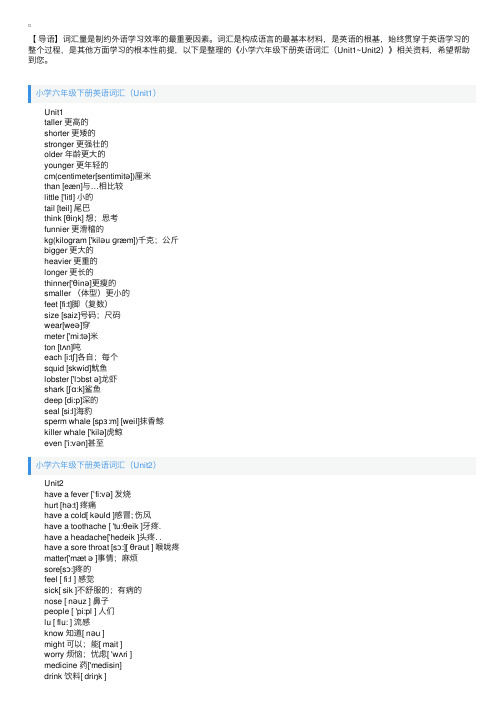
【导语】词汇量是制约外语学习效率的最重要因素。
词汇是构成语⾔的最基本材料,是英语的根基,始终贯穿于英语学习的整个过程,是其他⽅⾯学习的根本性前提,以下是整理的《⼩学六年级下册英语词汇(Unit1~Unit2)》相关资料,希望帮助到您。
⼩学六年级下册英语词汇(Unit1) Unit1 taller 更⾼的 shorter 更矮的 stronger 更强壮的 older 年龄更⼤的 younger 更年轻的 cm(centimeter[sentimitə])厘⽶ than [eæn]与…相⽐较 little ['litl] ⼩的 tail [teil] 尾巴 think [θiŋk] 想;思考 funnier 更滑稽的 kg(kilogram ['kiləu ɡræm])千克;公⽄ bigger 更⼤的 heavier 更重的 longer 更长的 thinner['θinə]更瘦的 smaller (体型)更⼩的 feet [fi:t]脚(复数) size [saiz]号码;尺码 wear[weə]穿 meter ['mi:tə]⽶ ton [tʌn]吨 each [i:tʃ]各⾃;每个 squid [skwid]鱿鱼 lobster ['lɔbst ə]龙虾 shark [ʃɑ:k]鲨鱼 deep [di:p]深的 seal [si:l]海豹 sperm whale [spɜ:m] [weil]抹⾹鲸 killer whale ['kilə]虎鲸 even ['i:vən]甚⾄⼩学六年级下册英语词汇(Unit2) Unit2 have a fever [ˈfi:və] 发烧 hurt [hə:t] 疼痛 have a cold[ kəuld ]感冒; 伤风 have a toothache [ 'tu:θeik ]⽛疼. have a headache['hedeik ]头疼. . have a sore throat [sɔ:][ θrəut ] 喉咙疼 matter['mæt ə ]事情;⿇烦 sore[sɔ:]疼的 feel [ fi:l ] 感觉 sick[ sik ]不舒服的;有病的 nose [ nəuz ] ⿐⼦ people [ 'pi:pl ] ⼈们 lu [ flu: ] 流感 know 知道[ nəu ] might 可以;能[ mait ] worry 烦恼;忧虑[ 'wʌri ] medicine 药['medisin] drink 饮料[ driŋk ] stay 在; 逗留[ stei ] better 更好的[ 'betə ] soon[ su:n ]⽴刻;不久 tired 疲劳的;累的[ taird ] excited 兴奋的[ ik'saitid ] angry['æŋgri]⽣⽓的;愤怒的 happy['hæpi]⾼兴的 bored[ bɒ:d ]⽆聊的;烦⼈的 sad[ sæd ]忧愁的;悲伤的 trip 旅⾏[ trip ] fail 不及格;失败[ feil ] test 测试[ test ] hear[ hiə ]听见;听到 match ⽐赛[ mæt ʃ ] between 在…之间[ bi'twi:n ] pass 传递[ pɑ:s ] kick 踢[ kik ] a little[ 'litl ]有些 goal[ gəul ]得分数 bounce[bauns]反弹 off[ ɒ:f ]距;离;离开 another[ ə'n ʌeə ]另⼀个 guess[ ges ] 猜测 win[ win ](过去式won [wʌn])赢 game ⽐赛;游戏[ geim ] laugh at[ lɑ:f ] [ æt ]因…⽽发笑。
小学六年级下册英语单词表苏教版

小学六年级下册英语单词表苏教版小学六年级下册英语单词表苏教版是苏教版小学六年级下册英语教材的常用词汇表。
这个单词表包含了学生在六年级下学期需要掌握的英语单词,它们涵盖了各个方面的词汇,包括人物、动物、食物、时间、地点、颜色、天气、运动、职业等等。
1. People(人物):- teacher(老师)- student(学生)- friend(朋友)- father(父亲)- mother(母亲)- brother(兄弟)- sister(姐妹)2. Animals(动物):- dog(狗)- cat(猫)- lion(狮子)- tiger(老虎)- elephant(大象)- giraffe(长颈鹿)- monkey(猴子)3. Food(食物):- apple(苹果)- banana(香蕉)- orange(橙子)- bread(面包)- rice(米饭)- fish(鱼)- chicken(鸡肉)4. Time(时间):- Monday(星期一)- Tuesday(星期二)- Wednesday(星期三)- Thursday(星期四)- Friday(星期五)- Saturday(星期六)- Sunday(星期日)5. Places(地点):- school(学校)- park(公园)- library(图书馆)- hospital(医院)- supermarket(超市)- zoo(动物园)- beach(海滩)6. Colors(颜色):- red(红色)- blue(蓝色)- yellow(黄色)- green(绿色)- orange(橙色)- purple(紫色)- black(黑色)7. Weather(天气):- sunny(晴天)- rainy(雨天)- cloudy(多云)- windy(有风)- snowy(雪天)- hot(热)- cold(冷)8. Sports(运动):- football(足球)- basketball(篮球)- tennis(网球)- swimming(游泳)- running(跑步)- cycling(骑自行车)- skating(滑冰)9. Jobs(职业):- doctor(医生)- teacher(老师)- police officer(警察)- firefighter(消防员)- chef(厨师)- astronaut(宇航员)- singer(歌手)10. Adjectives(形容词):- happy(快乐的)- sad(悲伤的)- tall(高的)- short(短的)- fat(胖的)- thin(瘦的)- big(大的)- small(小的)11. Verbs(动词):- read(阅读)- write(写作)- listen(听)- speak(说)- run(跑)- jump(跳)- swim(游泳)- dance(跳舞)12. Transportation(交通):- car(汽车)- bus(公共汽车)- train(火车)- plane(飞机)- bicycle(自行车)- motorcycle(摩托车)- boat(船)- ship(轮船)13. Clothing(服装):- shirt(衬衫)- pants(裤子)- dress(连衣裙)- skirt(短裙)- shoes(鞋子)- hat(帽子)- jacket(夹克)- coat(大衣)14. Furniture(家具):- table(桌子)- chair(椅子)- bed(床)- sofa(沙发)- wardrobe(衣柜)- desk(书桌)- shelf(书架)- lamp(台灯)15. Appliances(家电):- television(电视)- refrigerator(冰箱)- washing machine(洗衣机)- air conditioner(空调)- microwave oven(微波炉)- vacuum cleaner(吸尘器)- electric fan(电风扇)- water heater(热水器)16. Electronics(电子产品):- computer(电脑)- smartphone(智能手机)- tablet(平板电脑)- camera(相机)- keyboard(键盘)- mouse(鼠标)- speaker(扬声器)- headphones(耳机)17. Nature(自然):- mountain(山)- river(河流)- lake(湖泊)- sea(海洋)- forest(森林)- flower(花)- tree(树)- grass(草)18. Environment(环境):- air(空气)- water(水)- soil(土壤)- pollution(污染)- recycling(回收)- waste(废物)- energy(能源)- conservation(保护)19. Health(健康):- healthy(健康的)- sick(生病的)- exercise(锻炼)- diet(饮食)- medicine(药物)- hospital(医院)- doctor(医生)- nurse(护士)20. Culture(文化):- book(书籍)- movie(电影)- music(音乐)- art(艺术)- festival(节日)- tradition(传统)- history(历史)- language(语言)这些单词是六年级下学期英语教材中的重点词汇,学生需要通过学习和练习来掌握它们的发音、拼写和用法。
2024年人教版PEP小学英语六年级下册3-6年级词汇课件
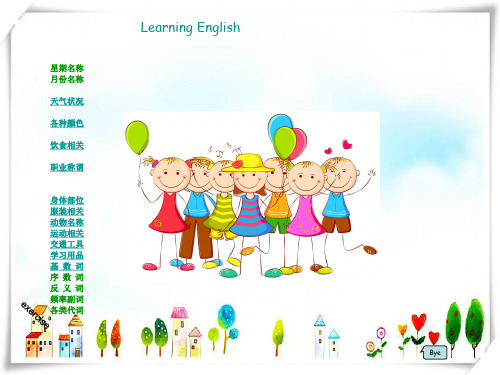
下雪的
有风的
warm cool
暖和的
凉爽的
weather
天气
breakfast lunch supper sugar cake
早餐
午餐
晚餐
糖
蛋糕
soup water juice milk
汤
水
果汁
牛奶
dumpling fish tea meat noodles
饺子
鱼
茶
肉
面条
rice
hamburger
米饭
汉堡包
chicken cookies eat
鸡肉
饼干
吃
ice cream drink
冰淇淋
喝
hungry
food
饥饿的
食物
cat dog duck elephant goat
猫
狗
鸭
大象
山羊
kangaroo lion monkey sheep
袋鼠
狮子
pig tiger wolf
猪
虎
狼
fish animal
牙齿
鼻子
肩膀
肘
胳膊
hand finger leg knee foot toe
手
手指
腿
膝盖
脚 脚趾
stomach skin bone muscle body
胃/肚子
Hale Waihona Puke 皮肤 骨骼;骨头 肌肉身体
hat scarf gloves shoes
帽子 围巾
手套
鞋
socks coat jacket shirt
袜子
第八
twelfth
第十二
人教版小学PEP英语五六年级下册知识点归纳

⼈教版⼩学PEP英语五六年级下册知识点归纳Unit 1 My day⼀、重点词汇。
五、重点句型。
1、询问别⼈什么时候做某事的句型及回答。
句型结构:问:When do you+动词短语原形+其他?(你/你们什么时候做某事?)答:I/We(+频度副词)+动词短语原形+at+具体时间(我/我们通常在⼏点做某事。
)例:问:When do you go to bed?(你什么时候上床睡觉?)答:I go to bed at 9:00p.m (我晚上9点上床睡觉。
)注意:当主语是第三⼈称单数(he,she,it,单个⼈名或单数名词)时,助动词do要变成does,句型结构是:When does+主语(第三⼈称单数)+动词短语原形+其他?2、询问别⼈周末做什么的句型及回答。
句型结构:问:What do you do on theweekend?(你周末做什么?)答:I(+频度副词)+动词(短语)+其他。
例:问:What do you do on theweekend?(你周末做什么?)答:I usually read books. (我通常看书。
)注意:当主语是第三⼈称单数(he,she,it,单个⼈名或单数名词)时,助动词do要变成does,句型结构是:What does+主语(第三⼈称单数)+do+on the weekend?六、四会句⼦:When do you finish class in the morning ? 你们上午的课到⼏点结束?We finish class at 1 o’clock . 我们⼀点钟结束上午的课。
What do you do on the weekend ? 你周末做什么?I often watch TV and play ping-pong with my father . 我经常看电视,也常和我爸爸⼀起打乒乓球。
七、语⾳:cl /kl/ clean clock class cleverpl /pl / plate eggplant please playUnit 2 My favourite season三、重点句型1、询问别⼈天⽓怎么样的句型及回答。
六年级下册一年级起点英语外研版单词

一、导言作为小学英语教育的重要阶段,六年级下册的一年级起点英语外研版单词是学生英语学习的重要基础。
本文将对六年级下册一年级起点英语外研版单词进行详细的介绍和解析,帮助学生更好地掌握这些单词,提高其英语学习水平。
二、单词列表及解析1. apple(n. 苹果)苹果是一种常见的水果,也是孩子们喜爱的零食之一。
在学习中,孩子们可以通过和苹果相关的图片或实物进行互动,帮助他们更好地理解和记忆这个单词。
2. book(n. 书)书是知识的载体,对于学生来说是非常重要的学习工具。
在学习中,教师可以通过展示不同类型的书籍,鼓励学生多读书,培养其阅读兴趣。
3. cat(n. 猫)猫是人类常见的宠物之一,也是孩子们喜欢的动物。
通过展示猫的图片或实物,教师可以引导学生学习这个单词,并了解猫的特点和习性。
4. dog(n. 狗)狗是人类的忠诚伙伴,也是孩子们喜欢的动物之一。
通过展示不同种类的狗和它们的特点,教师可以帮助学生更好地理解和记忆这个单词。
5. elephant(n. 大象)大象是一种庞大而温和的动物,在学生中很受欢迎。
教师可以通过展示大象的图片或实物,引导学生学习这个单词,并了解大象的生活习性。
6. fish(n. 鱼)鱼是一种常见的水生动物,也是人类重要的食物来源。
通过展示不同种类的鱼和鱼的生活习性,教师可以帮助学生更好地理解和记忆这个单词。
三、教学方法及建议1. 图片教学法在教学中可以通过展示图片的方式,让学生直观地了解单词所代表的物品或事物,帮助他们更好地记忆和理解单词的含义。
2. 实物教学法通过展示实物,让学生亲自接触和观察,可以激发他们的兴趣,增加记忆深度,提高学习效果。
3. 多媒体教学法利用多媒体设备,如投影仪、电脑等,展示相关的图片、视瓶或游戏,让学生通过视听方式进行学习,提高学习效果。
四、结语六年级下册一年级起点英语外研版单词是英语学习的重要基础,同时也是学生学习外语的开始阶段。
通过本文的介绍和解析,希望能够帮助学生更好地掌握这些单词,提高其英语学习水平,为将来的学习打下坚实的基础。
【课内词汇背背背】冀教版(三起) 小学英语 六年级(上册+下册) 词汇表(pdf版)

【课内词汇背背背】冀教版(三起) 小学英语六年级(上册+下册) 词汇表(pdf版)课内词汇背背背六年级(上)Unit 1home [h m] n.家time [ta m] n.时间clock [kl k] n.钟表house [ha s] n.房屋;房子study ['st di] n.学习kitchen ['k t n] n.厨房toilet ['t l t] n.坐便器;卫生间floor [fl ] n.地板;楼层there [ e ] adv.在那里;(表示存在或发生)breakfast ['brekf st] n.早餐table ['te bl] n.桌子put [p t] v.放;安置half [hɑ f] n.一半;半数dinner ['d n ] n.正餐;晚餐dirty ['d ti] adj.脏的lunch [l nt ] n.午餐me [mi ] pron.我(I 的宾格形式)him [h m] pron.他(he 的宾格形式)card [kɑ d] n.纸牌;卡片them [ em] pron.他(她/它)们(they 的宾格) Mr. [ m st ] 先生(男子姓名前)Mrs. [ m s z] 夫人;太太(己婚女子名前) Unit 2umbrella [ m'brel ] n.伞;雨伞Ms. [m z] 女士(女子姓前,不明婚否) driver ['dra v ] n.司机冀教版小学英语(三起)词汇表课内词汇背背背well [wel] adj.健康;(说话微停顿)对了,噢class [klɑ s] n.班级;课ill [ l] adj.有病;不舒服lesson ['lesn] n.课its [ ts] pron.它的word [w d] n.单词;字;话语always [' lwe z] adv.总是;永远sometimes ['s mta mz] adv.有时;间或Unit 3season ['si zn] n.季节spring [spr ] n.春天;春季summer ['s m ] n.夏天;夏季autumn [' t m] n.秋天;秋季winter ['w nt ] n.冬天;冬季put on [put n] 穿上;戴上take off [teik f] 脱掉; 起飞again [ 'gen] adv.再;又body [ b di] n.身体nose [n z] n.鼻子mouth [ma θ] n.嘴head [hed] n.头ear [ ] n.耳朵arm [ɑ m] n.胳膊leg [leg] n.腿eye [a ] n.眼睛think [θ k] v.认为;以为;想;思考can [k n] aux.能,会(过去式为could) why [hwa ] adv.为什么冀教版小学英语(三起)词汇表课内词汇背背背Unit 4holiday [ h l di] n.假日;节日bring [br ] v.带;带来(过去式为brought) give [g v] v.给;给予song [s ] n.歌曲tomorrow [t 'm r ] n.明天then [ en] adv.然后;接着put up ['p t p] 装饰;张贴open [' p n] v.打开little ['l tl] adj.幼小的;少许的六年级(下)Unit 1sport [sp t] n.运动football ['f tb l] n.足球any ['eni] det.任一;一些some [s m] det.一些wear [we ] v.穿or [ ] conj.或者;还是basketball ['b sk tb l] n.篮球try [tra ] v.试;尝试heavy ['hevi] adj.重的difficult ['d f k lt] adj.困难的;费力的easy ['i zi] adj.容易的hand [h nd] n.手冀教版小学英语(三起)词汇表课内词汇背背背game [ge m] n.比赛;游戏ask [ɑ sk] v.问very ['veri] adv.很;非常answer ['ɑ ns ] v.回答;答案policeman [p li sm n] n.警察Unit 2healthy ['helθi] adj.健康的strong [str ] adj.强壮的;有力的before [b 'f ] prep.在…之前after ['ɑ ft ] prep.在…之后bad [b d] adj.有害的;糟糕的next ['nekst] adj.紧接着;下一个的often [' f n] adv.常常;经常exercise ['eks sa z] v.锻炼;练习minute ['m n t] n.分(钟)hour [a ] n.小时high [ha ] adj.高;高的;在高处Unit 3fan [f n] n.风扇;扇子;扇close [kl z] v.关;关闭;合angry [' gri] adj.发怒的;生气的lake [le k] n.湖swim [sw m] v.游泳(过去式为swam) ship [ p] n.船;舰visit ['v z t] v.拜访;参观clever ['klev ] adj.聪明的Unit 4find [fa nd] v.发现,找到(过去式为found)冀教版小学英语(三起)词汇表课内词汇背背背get [get] v.开始,得到(过去式为got) party ['pɑ ti] n.聚会;晚会tell [tel] v.告诉;讲述begin [b 'g n] v.开始late [le t] adj.晚的;迟到的early [' li] adj.早的;早到的cake [ke k] n.蛋糕every ['evri] adj.每个(人或物)all [ l] det.全部;所有的good-bye [ɡ d-ba ] n.再见hear [h ] v.听见;听到。
人教版小学英语六年级下册:Unit1 How tall are you (A)

Unit1 How tall are you? (A)Focus PointsLet’s TalkTalk about how tall you and your classmates are?Warming Up一.听写__________________________________________________________________________________ __________________________________________________________________________________ __________________________________________________________________________________ __________________________________________________________________________________ __________________________________________________________________________________ __________________________________________________________________________________ 二.单词及短语1.更年轻的________________________2. 更年长的_______________________3.更高的__________________________4. 更矮的_________________________5.更长的__________________________6. 更瘦的_________________________7.更重的__________________________8. 更大的________________________9. 更小的_________________________ 10.更强壮的_______________________ 三.课文内容根据提示把课文补充完整。
部编版六年级英语下册必背必考知识点

部编版六年级英语下册必背必考知识点第一单元:动物朋友们1.1 单词1. zoo:动物园2. tiger:老虎3. elephant:大象4. monkey:猴子5. giraffe:长颈鹿6. lion:狮子7. seal:海豹8. panda:熊猫9. parrot:鹦鹉10. wild:野生的1.2 短语1. go to the zoo:去动物园2. a tall animal:一个高大的动物3. the biggest animal:最大的动物4. a small monkey:一个小猴子5. in the tree:在树上1.3 句型1. What's this?:这是什么?2. What's that?:那是什么?3. It's ...:它是...4. Do you like ...?:你喜欢...吗?5. Yes, I do./No, I don't.:是的,我喜欢./不,我不喜欢。
第二单元:我们的身体2.1 单词1. body:身体2. head:头3. eye:眼睛4. ear:耳朵5. nose:鼻子6. mouth:嘴7. arm:手臂8. hand:手9. leg:腿10. foot:脚2.2 短语1. head and shoulders:头和肩膀2. eyes and ears:眼睛和耳朵3. nose and mouth:鼻子和嘴4. arms and legs:手臂和腿2.3 句型1. I have ...:我有...2. He/She has ...:他/她有...3. Do you have ...?:你有...吗?4. Yes, I do./No, I don't.:是的,我有./不,我没有。
第三单元:颜色和形状3.1 单词1. red:红色2. yellow:黄色3. blue:蓝色4. green:绿色5. black:黑色6. white:白色7. purple:紫色8. orange:橙色9. round:圆的10. square:平方的3.2 短语1. red and yellow:红色和黄色2. blue and green:蓝色和绿色3. black and white:黑色和白色4. purple and orange:紫色和橙色3.3 句型1. What color is it?:它是什么颜色?2. It's ...:它是...3. What shape is it?:它是什么形状?4. It's ...:它是...第四单元:食物和饮料4.1 单词1. apple:苹果2. banana:香蕉3. orange:橙子4. grape:葡萄5. watermelon:西瓜6. pear:梨7. rice:米饭8. noodles:面条9. meat:肉10. egg:鸡蛋4.2 短语1. eat fruit:吃水果2. drink milk:喝牛奶3. have a meal:吃一顿饭4.3 句型1. What do you like?:你喜欢什么?2. I like ...:我喜欢...3. What do you want?:你想要什么?4. I want ...:我想要...第五单元:家庭和朋友5.1 单词1. father:父亲2. mother:母亲3. brother:兄弟4. sister:姐妹5. grandfather:祖父6. grandmother:祖母7. friend:朋友5.2 短语1. my family:我的家人2. your family:你的家人3. his family:他的家人4. her family:她的家人5.3 句型1. Who's this?:这是谁?2. Who's that?:那是谁?3. It's ...:它是...4. Is it ...?:它是...吗?以上是部编版六年级英语下册必背必考知识点的详细内容,希望对大家有所帮助。
- 1、下载文档前请自行甄别文档内容的完整性,平台不提供额外的编辑、内容补充、找答案等附加服务。
- 2、"仅部分预览"的文档,不可在线预览部分如存在完整性等问题,可反馈申请退款(可完整预览的文档不适用该条件!)。
- 3、如文档侵犯您的权益,请联系客服反馈,我们会尽快为您处理(人工客服工作时间:9:00-18:30)。
小学英语六年级下册词汇和阅读一、词汇1.There _____(be)more dinosaurs over there.2.I _____(am) quiet then.3.Who is_____(short) than you?4.You look _____(tall )than me.5.It _____(look) like a mule!6.Bill is _____(play) ping-pong.7.We can write ____(a) email and say sorry to them.8.I’m ______(更高的)than Jim.9.This book is _______(更重的)than that book.10.M y uncle is _______(更年轻的) than my father.11.W hat did you do______(昨天)?12.He _____(洗)his clothes last Sunday.13.I can’t play_____(羽毛球).14.I couldn’t go ______(骑自行车运动).15.T here was no ______(体育馆) last year.二.单项选择1._____ was your weekend?A. WhichB. WhoC. HowD. Where2.______you do ______ else yesterday?A. Did ;somethingB. Did ; anythingC. Do ;somethingD. Do ;anything3. _____weekend ,two students ______their clothes.A. Last; washedB. Last ; washC. Next ; washedD. Next ; wash4. Let’s go to school _____bus.A. byB. withC. atD. in5.Thank you for _____in our hotel. How ____your holiday?A. staying ; wasB. staying; wereC. stay; wasD. stay;were6.WuYifan often _____a race with his father and Max.A. havingB. havesC. hadD. have7.There ______ many animals ______that race.A. were; inB. was; inC. were ;onD. was ;one ______look at Mike’s old_______.A. and ;photosB. and; photoesC.with; photosD.with; photoes9.At that time, people _____go ______bus.A. don’t ; onB. didn’t ;onC.don’t ;byD. didn’t ; by10._____a dream!A.WhereB. WhenC. WhatD.How11.It’s time to _____goodbye.A.saysB. sayC.saidD.saying12.We are all _____to middle school soon.A. goingB. goesC. wentD. go13.Your ______are bigger than______.A.feet;myB.feet; mineC. foot ;myD.foot ;I14. Mike _____fast! Look! He _____faster than Tom.A. runs; runB.run; runC.runs; is runningD.run;running15.About ______people are in the People’s Park on weekends.A.two hundredsB. two hundreds ofC. two hundredD. hundred of三.阅读理解(一)The USA is the fourth largest country in the world. It is smaller than Russia, Canada and China. Washington DC is its capital. But it is a quiet city. New York is the biggest city in the world. It is in the east of the USA and at the north of the Hudson River. A large party of the city is on Manhattan Island, a big island in the river. New York has a larger population than Washington DC.In New York we can see the famous statue, the Statue of Liberty.根据短文内容选择正确答案()1.The USA is the ______largest country in the world.A.secondB. thirdC.fourth( )2.Washington DC has a ______population than New York.rgerB. smallerC.more( )3.Washington DC is _____than New York.rgerB.more crowedC.quieter( )4.A large party of New York is on ______.A.an islandB.the seaC.the lake( )5.New York is one of the _____cities in theworld.A.quietestB.biggest C .oldest(二)Mary, Jane and May are very good friends. Mary is shorter than May, May is heavier than Jane. Jane is thinner than Mary. How old are they? Mary is 7 years old. Jane is 12 years old and May is 9 years old. They study at QingLanPrimary School. Mary likes English, Jane likes math and May likes music. They all study hard.根据短文内容,判断句子正(T)误(F)( ) 1.There are 3 children in the story.( ) 2. Mary is shorter than May.( ) 3.Mary is heavier than Jane.( ) 4. Jane is the youngest.( ) 5. They are all good friends.(三)In winter, the weather is very cold. Some people feel sick in the cold weather. If you don’t wear enough clothes, you will have a cold. How do you feel if you have a cold? You will be very tired. Your head may hurt badly. Your temperature(体温)will be higher than 37℃,then the cold may turn into a fever. But don’t worry if you are sick, go to see a doctor. Take some medicine and stay in bed for a few days. And drink more hot water. Then you will get well soon.( ) 1. People feel sick in w inter because it’s.A. warmB. cold( ) 2. If you have a cold you will be.A. tired.B. happy.( ) 3. If your temperature is higher than 37℃you will.A. have a cold.B. have a fever.( ) 4. If you are sick, you must.A. see a doctor.B. go to school.( ) 5.is good for you when you’re sick.A. Drinking hot water.B. Drinking cold water(四)Wu Yifan was busy last weekend.He visited his grandmother on Saturday morning.It was his grandma's birthday.They cooked noodlestogether.In theevening,they watched TV.On Sunday morning,WuYifan played football with his friends.In the afternoon,he washed clothes and cleaned his room.根据短文内容,判断句子正(T)误(F)( )1.WuYifan visited his grandparents Saturday morning.( )2.He cooked noodles with his grandmother.( )3.In the evening.They watched TV together.( )4.WuYifan played football with his parents.( )5.Sunday afternoon he washed clothes and cleaned his room.(五)Jacky stayed at home last weekend. He ate a lot of chocolates, ice-cream, chips, apples, bananas and chicken wings. After a moment he felt sick. He had a stomachache. His mother asked him to take some medicine. After about three hours, Jacky felt better. His mother said to him,“You shouldn’t eat too much food from now on. That’s not a good habit.”根据短文内容,判断句子正(T)误(F)( ) 1. Jacky was at home last weekend.( ) 2. Jacky ate a lot of chocolates, ice-cream and eggs.( ) 3. Jacky had a headache.( ) 4. Jacky’s mother asked Jacky to take some medicine.( ) 5. Jacky has a bad habit.(六)Mary comes from the USA. Now she is working in Tianjin. Every morning she gets up very early. She goes to work by car. She starts her work at 8:30. She is very busy. She has lunch at 12:30. After lunch she works again. She finishes (结束) her work at 5:30 p.m. In the evening, she takes Chinese lessons. She wants to learn Chinese. She likes to live in China and work with Chinese people.根据短文内容,选择正确答案( ) 1. Mary is _________.A. ChineseB. JapaneseC. American( ) 2. How does Mary go to work?A. By car.B. By bus.C. On foot.( ) 3. When does she begin to work?A. 12:30B.8: 00C. 8:30( ) 4. What does she do in the evening?A. Watches TV.B. Reads book.C.Takes Chinese lesson( ) 5. Does she like China?A. Yes, she does.B. No, she doesn't.C. I don't know.2016六年级下册词汇和阅读答案一词汇1.are2.was3.shorter4.taller5.looks6.playing7.an8.higher9.heavier10.y ounger11.y esterday12.w ashed13.b adminton14.b iking15.g ym二单项选择1-5 CBAAA 6-10 BCADC 10-15 BABCC 三阅读理解一CBCAB 二TTFFT 三BABAA四TTTFT 五TFFTT 六CACCA。
